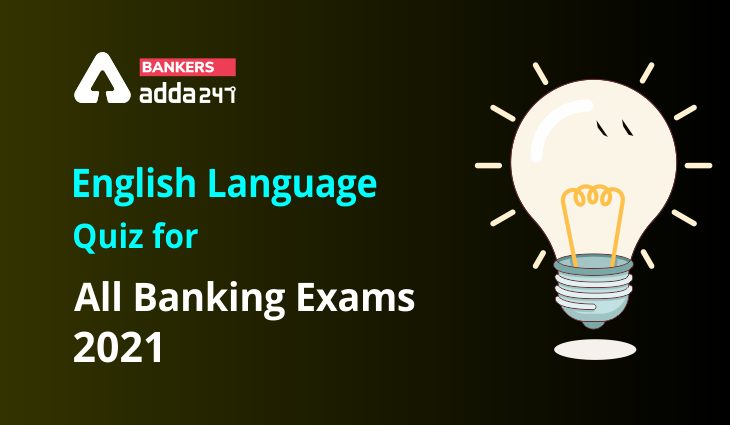Directions (1-15): Identify the error in the given sentences. If there is no error, mark (e) as your answer choice.
Q1. (A) The officers/(B) who were on inspection/(C) in this exam centre were discovered/(D) many discrepancies. /(E) No error.
(a)A
(b)B
(c)C
(d)D
(e)E
Q2. (A) The teacher asked/(B) the students whether they/(C) could tell the name of the man /(D) who had been invented electricity./(E) No error.
(a)A
(b)B
(c)C
(d)D
(e)E
Q3. (A) She held a gun/(B) in her hand which/(C) was totally hiding in the long cloak /(D) that she was wearing. /(E) No error.
(a)A
(b)B
(c)C
(d)D
(e)E
Q4. (A) I was surprise/(B) at her contemptuous behaviour/(C)as she was considered/(D) an obedient child/(E)No error.
(a)A
(b)B
(c)C
(d)D
(e)E
Q5. (A) Had the police not/(B) reached there/(C)on time, the bank/(D) would have robbed./(E) No error.
(a)A
(b)B
(c)C
(d)D
(e)E
Q6. (A) The soldier seriously injured/(B) during the cross fire/(C) and was rushed/(D) to hospital/ (E)No error.
(a)A
(b)B
(c)C
(d)D
(e)E
Q7. (A) Police officers sent/(B) to the place of crime and /(C) every nook and corner/(D) was thoroughly checked./(E) No error.
(a)A
(b)B
(c)C
(d)D
(e)E
Q8. (A) When the police officer was shot dead/(B) people were run/(C) here and there/(D) to save themselves./(E) No error.
(a)A
(b)B
(c)C
(d)D
(e)E
Q9. (A) Mother’s love/(B) cannot substituted/(C) by anything/(D) else in this world./(E) No error.
(a)A
(b)B
(c)C
(d)D
(e)E
Q10. (A) When the robber broke into/(B) the bank, the/(C) staff raised a hue and cry and the robber caught /(D) immediately by the people./(E) No error.
(a)A
(b)B
(c)C
(d)D
(e)E
Q11. (A) The city/(B) was tore/(C)by earthquake/ (D) previous year./(E)No error.
(a)A
(b)B
(c)C
(d)D
(e)E
Q12. (A) The taxi driver/(B) was accused the man/(C) for walking in/(D) the middle of the road./(E) No error.
(a)A
(b)B
(c)C
(d)D
(e)E
Q13. (A) Some passengers/(B) were flew/(C)to London on/ (D) the last trip./(E) No error.
(a)A
(b)B
(c)C
(d)D
(e)E
Q14. (A) By the time/(B) he arrived,/ (C) everybody had been/(D) left for the party./ (E) No error.
(a)A
(b)B
(c)C
(d)D
(e)E
Q15. (A) She was/ (B) extremely annoyed/(C) by/ (D) the ill behavior of the bank staff./(E) No error.
(a)A
(b)B
(c)C
(d)D
(e)E
Practice More Questions of English for Competitive Exams:
English for Competitive Exams |
Basic English Language Quiz for All Banking Exams- 27th April |
Basic English Language Quiz for All Banking Exams- 26th April |
Solutions
S1. Ans. (c)
Sol. ‘were’ should be removed from here. Since, past indefinite tense ‘V2’ is used in active voice.
S2. Ans. (d)
Sol. ‘been’ should not be used here. Since, the given sentence is in active voice hence, the structure ‘had
+ been + v3’ will not be used here.
S3. Ans. (c);
Sol. ‘hidden’ should be used in place of ‘hiding’.
S4. Ans. (a)
Sol. ‘surprised’ should be use in place of ‘surprise. Since the given sentence is in passive voice. Hence, ‘V3’ should be used.
S5. Ans. (d);
Sol. ‘would have been’ should be used in place of ‘would have’. Since the given sentence is in passive voice. Hence, ‘would + have + been” should be used.
S6. Ans. (a)
Sol. ‘The soldier was seriously injured’ should be used in place of ‘The soldier seriously injured’. Since ‘The soldier seriously injured’ means that ‘The soldier was involved in the act of injuring someone’.
S7. Ans. (a)
Sol. ‘were sent’ should be used in place of ‘sent’
S8. Ans. (b)
Sol. ‘were run’ should be replaced with ‘ran’. Since the given sentence is in active voice.
S9. Ans. (b)
Sol. ‘be’ should be added after ‘cannot’. Since, in passive voice, the structure ‘model + be + v3’ is used.
S10. Ans.(c)
Sol. ‘robber was caught’ should be used in place of ‘robber caught’. Since ‘robber caught’ means ‘robber was the doer of the action’.
S11. Ans.(b)
Sol. ‘torn’ should be used in place of ‘tore’. Since, in passive voice, ‘V3’ is used after ‘was/were.
S12. Ans. (b)
Sol. ‘was’ should not be used here. Since the sentence is not in passive voice
S13. Ans.(b)
Sol. ‘flown’ (v3) should be used in place of ‘flew’. Since, the given sentence is in passive voice. Hence, V3 should be used.
S14. Ans.(c)
Sol. ‘been’ should be removed from the given sentence. Since, the given sentence is in active voice, Hence ‘has/have/had + been’ should not be used.
S15. An.(c)
Sol. ‘at’ should be used in place of ‘by’. Since, we are ‘annoyed at something’ and ‘annoyed with someone’.



 English Language Quiz For Bank Foundatio...
English Language Quiz For Bank Foundatio...
 English Language Quiz For Bank Mains Exa...
English Language Quiz For Bank Mains Exa...


